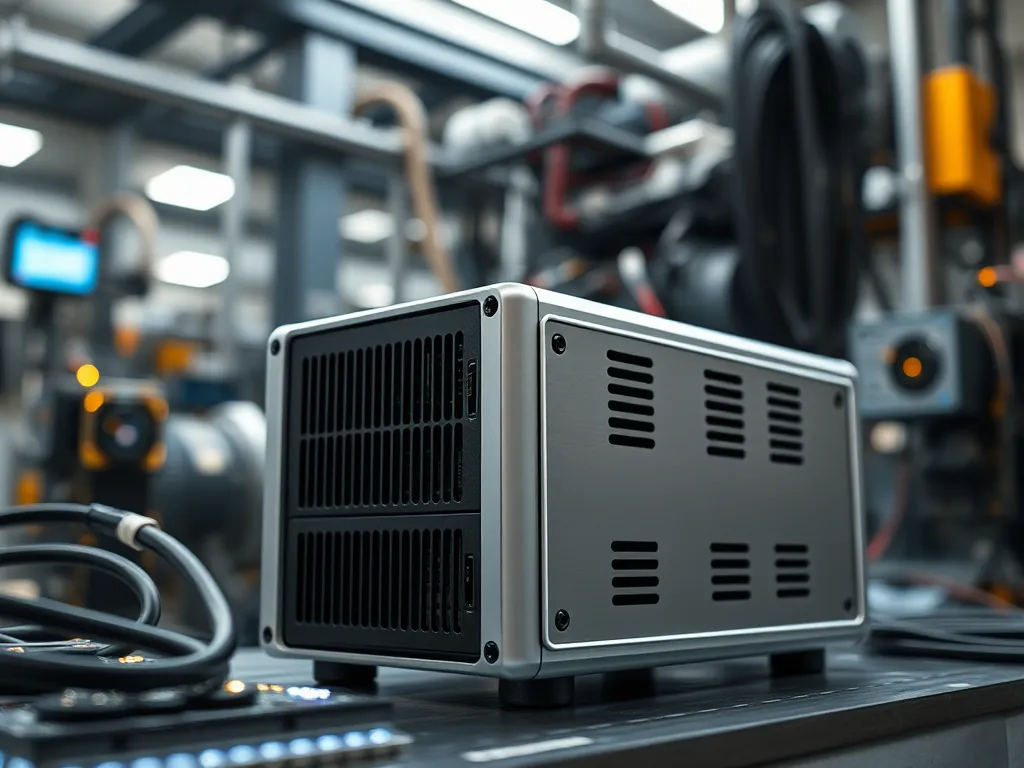Exploring the Benefits of Fanless Industrial PCs

Exploring the World of Fanless Industrial PCs
Fanless Industrial PCs have become increasingly popular in various industries due to their robust design and unique capabilities. Unlike traditional PCs that rely on cooling fans, Fanless Industrial PCs utilize thermal management techniques to dissipate heat naturally, resulting in a more reliable and quieter operation. Their design is particularly advantageous in environments that require minimal noise, dust resistance, and optimal performance under high-stress conditions.
The growing demand for technology that can withstand harsh industrial environments has led to the development of Fanless Industrial PCs. These systems are built with durable components and often come in sealed enclosures that protect against dust, water, and other environmental factors. As industries modernize and adopt automation, the need for efficient and reliable computing solutions grows, making Fanless Industrial PCs a key player in industrial technology.
Opting for a fanless pc not only enhances performance but also contributes to a quieter workspace.
Fanless Industrial PCs are characterized by several features that make them suitable for industrial applications. Their lack of moving parts not only reduces the risk of mechanical failure but also enhances their longevity. Moreover, with advancements in computing power, these systems now offer capabilities comparable to traditional PCs. This performance, combined with fanless technology, provides an attractive option for industries looking to upgrade their computing systems without the trade-offs usually associated with industrial PCs.
The advanced technology employed by esis sets a new standard in the industrial electronics sector.
In addition to their structural benefits, Fanless Industrial PCs are designed to operate efficiently in a range of temperatures, making them ideal for diverse applications—from manufacturing lines to healthcare settings. The ability to install these systems in locations that require dust resistance and low noise levels further solidifies their position as a preferred choice for many industrial applications. By leveraging the latest technology, businesses can foster productivity with a reliable and efficient computing solution.
With innovative solutions at esis pty ltd, businesses can embrace cutting-edge technology to drive efficiency.
As industries continue to evolve, the reliance on technology increases, and Fanless Industrial PCs are at the forefront of this transformation. They provide a compelling solution for a variety of applications, with advantages that cater to the specific needs of industrial environments, ultimately improving operational efficiency and reliability.
Advantages of Fanless Industrial PCs
One of the primary advantages of Fanless Industrial PCs is the substantially lower noise levels they produce in production areas. This is especially important in settings like hospitals or laboratories where a quiet environment is crucial for concentration and comfort. The absence of fans eliminates the noise associated with mechanical components, allowing for a more peaceful workspace.
Increased reliability and longevity are hallmark features of Fanless Industrial PCs. Without moving parts, these systems are less prone to mechanical breakdown and can operate continuously for extended periods without maintenance interruptions. This reliability minimizes downtime, which is critical in industrial applications where every minute counts.
Energy efficiency and reduced power consumption are significant advantages of Fanless Industrial PCs. By eliminating the need for cooling fans, which consume additional power, these systems typically have lower overall energy usage. This not only leads to cost savings but also supports sustainability goals by reducing the carbon footprint of industrial operations.
Fanless Industrial PCs are ideal for harsh environments, as their design often includes ruggedized enclosures that can withstand extremes in temperature, moisture, and dust. This durability ensures that the technology can function effectively in challenging settings, from manufacturing floors to outdoor installations.
Greater thermal management without fans is another advantage of Fanless Industrial PCs. These systems use advanced materials and design techniques to dissipate heat through conduction and convection, maintaining optimal operational temperatures without the noise and failure risks associated with traditional cooling methods.
Applications of Fanless Industrial PCs
Manufacturing and automation are primary areas where Fanless Industrial PCs are utilized. They control machinery, process data, and monitor production workflows without the noise and maintenance issues posed by conventional PCs, enhancing overall efficiency on the factory floor.
Transportation and logistics also benefit from Fanless Industrial PCs. These systems can be employed for tracking shipments, managing inventory, and automating various logistical tasks, all while ensuring reliable performance in transit conditions that may be less than optimal for traditional computers.
In healthcare and medical devices, Fanless Industrial PCs play a crucial role in systems needing high reliability without noise—such as patient monitoring systems and laboratory equipment. Their robust design and extended operational timelines ensure they meet the critical standards required in healthcare environments.
Retail and point-of-sale systems have embraced Fanless Industrial PCs for their compact size and reliability. These systems provide seamless transaction processing and inventory management without the distractions caused by noise, creating a more pleasant shopping experience for customers.
Energy management and monitoring are other significant applications of Fanless Industrial PCs. With the rise of smart energy solutions, these systems can collect and analyze data to optimize energy usage and support sustainability initiatives within organizations.
Comparison with Traditional PCs
When comparing performance metrics in industrial settings, Fanless Industrial PCs often deliver comparable or superior performance compared to traditional PCs. They are designed to handle industrial-grade workloads, making them suitable for applications that require extended operation times and high reliability.
Cost-effectiveness over time is another critical comparison point. Although the initial investment in Fanless Industrial PCs may be higher than traditional PCs, the reduced maintenance costs, lower energy consumption, and increased lifespan often offset the higher purchase price, leading to long-term savings.
Maintenance considerations are crucial when evaluating Fanless Industrial PCs versus their traditional counterparts. With no moving parts, fanless systems require less frequent maintenance and have lower chances of failure, reducing the need for costly repairs and downtime.
Durability and build quality are significant factors distinguishing Fanless Industrial PCs from traditional models. The rugged design, often environmental sealed, ensures they can withstand industrial environments where dust and moisture are prevalent, whereas traditional PCs may require additional protective measures.
Heat management solutions are an essential aspect of industrial computing. While traditional PCs rely on fans to cool down their components, Fanless Industrial PCs utilize passive cooling technologies that can be more efficient in the long run, preventing issues related to overheating and ensuring consistent performance over time.
Design and Technology Innovations
Advancements in thermal design have led to significant improvements in Fanless Industrial PCs. Innovative thermal management solutions now allow for smaller form factors while maintaining optimal performance levels, pushing the boundaries of where these systems can be deployed.
Compact and rugged enclosures are also defining features of modern Fanless Industrial PCs. These tailored designs improve portability while ensuring robust protection against environmental hazards, making them suitable for a wide range of applications.
The integration of IoT capabilities in Fanless Industrial PCs represents a major step forward in industrial technology. By enabling connectivity, these systems can facilitate real-time data collection and analysis, paving the way for smart manufacturing and predictive maintenance strategies.
Custom motherboard design is becoming more prevalent in Fanless Industrial PCs, allowing manufacturers to create components that address specific industry needs, enhance performance, and improve overall system integration.
Looking to the future, trends in industrial computing indicate a growing focus on energy efficiency, enhanced performance metrics, and diversified application potential. Fanless Industrial PCs are well-positioned to capitalize on these trends and continue to meet the evolving demands of various industries.
Choosing the Right Fanless Industrial PC
When selecting a Fanless Industrial PC, it is essential to consider key specifications such as processing power, memory, storage capacity, and connectivity options to ensure the system meets the specific requirements of the intended application.
Evaluating vendor options and support is crucial when choosing a Fanless Industrial PC. It is important to partner with reputable manufacturers that offer comprehensive support, warranty options, and accessibility to replacement parts to ensure long-term satisfaction and reliability.
Assessing scalability and upgrade paths is important for future-proofing investments in Fanless Industrial PCs. Companies should consider systems that allow easy upgrades in processing power, memory, or additional functionalities to adapt to growing operational needs.
Importance of certifications and compliance cannot be overlooked when selecting Fanless Industrial PCs. Relevant certifications ensure that systems meet industry standards for safety, performance, and environmental regulations, providing peace of mind in critical applications.
Finally, user case studies and testimonials can provide valuable insights into the performance and reliability of specific Fanless Industrial PC models. Learning from the experiences of other users can help organizations make informed decisions that align with their operational needs.
